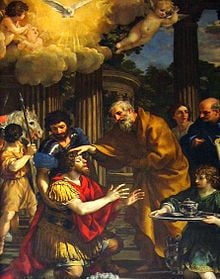Bible: What Does Acts 9:1-31 Teach Us About Saul's Conversion and His Early Ministry?
The Apostle Paul

God's Messenger to Paul
view quiz statisticsActs 9--Saul's Conversion on the Road to Damascus/The Church Accepts Paul
Saul Receives Authority to Persecute Christians
Returning to the Saul narrative, Luke picks up his account where the future apostle left off: “still breathing threats and murder against the disciples of the Lord” (v. 1a).
Vehement, seething hatred motivates Saul to request official business documents from the high priest (still Annas?) that would grant him the authority of a deputy to arrest men and women of “the Way”—the name opponents gave to followers of Christ—who are attending Damascus synagogues (vv. 1b-2).
Paul's Conversion
After acquiring these letters, Saul sets out for the Syrian city; however, while approaching his destination, he falls off his horse, a bright, heavenly light having disoriented him (vv. 3-4a).
Out of this light a Voice addresses Saul, asking him, “Why are you persecuting Me?” (v. 4b)
[By persecuting the Church, the Body of Christ, Saul was truly attacking Jesus.]
Unless Saul is persecuting others he considered heretics at this time, his inquiry into the Voice’s identity shows that he has not yet put two and two together (v. 5a).
[Why should Saul address his Assailant as “Lord,” and then ask Him His identity?
Besides Jesus, whom else would Saul think he was persecuting and would be addressing him out of a bright light?]
Jesus identifies Himself as the Object of Saul’s hateful efforts (v. 5b), and then commands His newest disciple to enter Damascus where someone would tell him the next step in his new life (v. 6b).
[Jesus’ subsequent comment in verse five about Saul’s difficulties in fighting against the pangs of his conscience—“It is hard for you to kick against the goads”—does not appear in most MSS.
The Authorized Version, however, includes both it and Saul’s dazed inquiry into what the Lord wanted him to do (the first half of verse six)].
Interestingly, Saul’s traveling companions, who hear a voice but see no form, lead the now blind, former persecutor into the city where he fasts (voluntarily or not) for three days (vv. 7-9).
Ananias

Ananias: Paul's Guide
Ananias Performs a Valuable Service
While Saul is praying in the home of a disciple named Judas who lived on Straight Street, Damascus, Jesus appears to another disciple (namely, Ananias) in a vision, and tells him to visit the new convert (vv. 10-11).
Saul himself had just seen Ananias in a vision in which the latter is placing his hand on him, so that he can receive his sight (v. 12).
Seeking clarification of this potentially dangerous mission—Ananias apparently entertained no doubts about Who was communicating these instructions to him—, the disciple informs Jesus of his knowledge of Saul’s reputation as a persecutor of the Church (“Your saints in Jerusalem,” [v. 13b]; “who call on Your name” [v. 14b]).
Not only does the Lord reiterate His command (“Go”), but He also deigns to make known to Ananias that He has chosen Saul as a worldwide witness (“Gentiles, kings, and children of Israel”) [v. 15].
[If Ananias had truly understood that the Lord was speaking to him, he should not have asked for an explanation of his mission; he should have implicitly trusted God’s word.
However, a rational man normally does not risk his life for someone else unless he has, at least, an acceptable reason to do so.
Ananias cannot simply obey the vision without question, because its message appears to run counter to rationality.
He asks Christ, in essence, “Why should I risk my life for someone who kills people like me?”
Jesus, perfectly understanding human nature, having created mankind a rational being, graciously provides an answer for him.]
Extraordinary suffering often accompanies the privilege of being involved in extensive evangelism efforts; Jesus tells Ananias that He will allow Saul to experience plenty of the former (v. 16).
[What purpose might the Lord have had for bringing great suffering Paul’s way, except that the apostle might experience God’s strength in abundance (cf. 2 Cor. 12:7-10).]
Satisfied by Christ’s answer, Ananias obeys the Lord’s directive by traveling to Saul’s location and identifying (by laying his hands on him) the former persecutor with the people he had been harming.
Addressing him now as a spiritual brother, Ananias informs him that he has come at Jesus’ behest in order that Saul “may receive his sight and be filled with Holy Spirit” (v. 17).
After hearing this report, Saul immediately receives back his sight.
According to the text, an actual physical substance resembling scales falls from his eyes (v. 18a).
Afterwards, Saul submits to immersion, breaks his three-day fast, and fellowships with Damascus believers for several days (vv. 18b-19).
Alone with God
view quiz statisticsBarnabas

Barnabas' Role in Paul's Acceptance
Paul Preaches in Damascus and Jerusalem
Beginning in Damascus synagogues, Saul’s preaching ministry emphasizes the deity of Jesus the Christ (v. 20).
His amazing conversion from persecutor to servant of the gospel astounds the Jews there (v. 21).
His overall strength increasing, Saul eventually becomes an effective apologist for Christ (v. 22).
[Paul records in Galatians 1:17 that he spent time in Arabia after his conversion; there he pondered the implications of the gospel, but did not confer with any apostle.
Having completed that “internship,” he returned to Damascus.]
A total of three years—Luke’s “many days”—passes before the Jews plot his assassination (v. 23a; cf. Gal. 1:18); with the aid of disciples and a large basket, Saul foils his enemies’ designs by escaping to Jerusalem through the city wall (vv. 24-26a).
In Jerusalem, Saul encounters brief resistance to his desire to join the church—considering Saul’s record of accomplishment, a highly reasonable reluctance on the assembly’s part—until Barnabas intercedes for him.
Seeking to convince the apostles of the new convert’s authenticity, he recounts Saul’s spiritual experience with Christ and his subsequent preaching ministry in Damascus (vv. 26b-27).
Receiving apostolic approval, Saul freely associates with the believers and begins ministering the word (vv. 28-29a).
However, another faction of Israelites—Greek-speaking Jews—attempts to kill him this time; Saul, therefore, relocates to Tarsus via Caesarea with the aid of the brethren (vv. 29b-30).
At this point, Luke inserts a summary statement that indicated that the Church all over Israel was experiencing both spiritual (“had peace,” “were edified,” “walking in the fear of the Lord and in the comfort of the Holy Spirit”) and numerical growth (“they were multiplied”) [v. 31; cf. 2:47; 5:11-14; 16:5].
© 2013 glynch1








